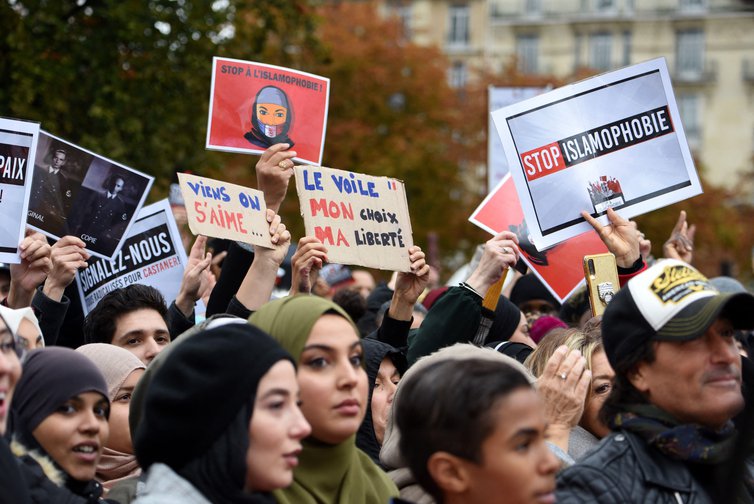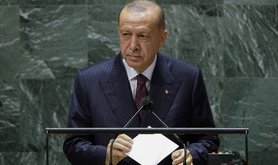
Freedom of religion or freedom for religion?
Why critiques of secularism, especially in France, fundamentally misunderstand the principles of equality and human rights on which it is based
As the debate on Islam and Islamism rages on in France, so do occasional acts of violence directed at the country’s Muslim minority such as two incidents on 4 and 24 April. There have also been letters from retired and active military officers, threatening – or warning about – an impending civil war. Then there is the anxiety caused by the growing popularity of Marine Le Pen ahead of the 2022 presidential election, which President Macron hopes to counter with policies to curb what he calls “Islamist separatism”.
Alongside these events, the critique of secularism (laïcité) rages on in academic circles. Having been thrashed in recent decades by postmodernist and multiculturalist thinking, exemplified in Michel Foucault’s praising of the Iranian Revolution, secularism is often portrayed as restricting the freedom of religion, particularly of Muslim minorities in Europe. It is accused of contributing to the rise of radical Islamism – even though recent empirical research on the possible connection between government interference in religious institutions and terrorism finds no conclusive evidence.
Regardless, the view that blames secularism has many followers, such as the French sociologist Farhad Khosrokhavar, who argued after the beheading of a teacher in Paris in October 2020 that “France’s extreme form of secularism and its embrace of blasphemy [...] has fueled radicalism among a marginalised minority.” The controversial piece, initially published in Politico Europe, was subsequently withdrawn by its editor, leading to a condemnation by the author.
It is the responsibility of the democratic state to intervene precisely in order to protect the freedom of all individuals
My concern here is not to discuss the past and present mistakes of the French government in its treatment of Muslim citizens and immigrants, but rather the conceptual meaning of secularism, which is often misconstrued. These critiques leave it unclear what exactly is wrong with secularism, or even its “extreme” form.
In a series of essays advancing a defense of secularism on openDemocracy, I suggest that it is best understood as the institutional arrangement that keeps politics free of religion, while securing the right of individuals to the freedom of thought, conscience and belief, as protected by international human rights conventions.
To further specify the meaning of this right, I emphasise that freedom of religion “does not mean freedom for religion(s); it only means the freedom of an individual to have any religious belief they may wish to have, as long as their practice of that religion does not interfere with the rights and freedoms of others. This freedom does not protect religion itself, but the right to believe in one.”
Yet a frequent objection to secularism is based on a confusion of these two concepts, with the argument that because secularism does not allow freedom for religion, the liberal secular state’s promise of ‘neutrality’ towards religion is unmet or simply bogus.
The meaning of secularism
A recent, emblematic example is an article by Mohamed Amer Meziane, who attempts to demonstrate what he describes as the “impossibility of secularism,” meaning that secularism is internally contradictory. The target of the critique is, predictably, France: “In a performative contradiction, the French state polices Islam in order to make sure that the separation of religion and politics is respected, enacting secularism’s impossibility.”
In more plain language, the point is that the secularist state intervenes in order to secure secularist separation, and hence it contradicts its own principle of non-intervention.
But this critique relies on a fallacy, a misunderstanding of the meaning of secularism. The author claims: “Far from implementing a radical separation, the French law of 1905 can be seen as a way of acknowledging religious freedom only to the extent that it can be regulated and restricted in the name of public order.”
The 1905 Law on the Separation of Church and State states in its first article that the French Republic guarantees freedom of conscience and worship, within limits spelled out in the law in the interest of public order. It then mainly goes on to address issues of church property: only briefly towards the end does the law clearly specify what actions count as disturbing public order.
Even if it went as far as Meziane’s rendering implies, there would be nothing wrong with this provision – an earlier formulation of which may be found in Article 10 of the 1789 Declaration of the Rights of Man: “No man ought to be molested on account of his opinions, not even on account of his religious opinions, provided his avowal of them does not disturb the public order established by law.”
Article 9 of the European Convention of Human Rights (1950) has two clauses. The first one, borrowed from Article 18 of the Universal Declaration of Human Rights (1948), declares: “Everyone has the right to freedom of thought, conscience and religion.” Significantly, the Article places conscience and religion on a par with “thought” (a this-worldly activity!) on which topic the reader may consult the important article by Heiner Bielefeldt, the UN’s former Special Rapporteur on freedom of religion or belief.
Put simply, it means that you are perfectly entitled to hold any belief that you wish, but your belief does not occupy a higher plane than any thought that anyone else may have – all of which are protected, but only within limits, as per the second clause.
Limits to freedom?
The second clause defines the limits of the mentioned freedoms – which, one would have to agree, could not reasonably be contested: “Freedom to manifest one’s religion or beliefs shall be subject only to such limitations as are prescribed by law and are necessary in a democratic society in the interests of public safety, for the protection of public order, health or morals, or for the protection of the rights and freedoms of others.”
It logically follows that the secular state has a responsibility to make sure that citizens who do not belong to the majority religion, or to any religion at all, feel as entitled and safe as the adherents of the majority religion or any other. The state may have to intervene in the communal affairs of the religious precisely in order to ensure this equality and freedom.
Yet, the author objects: “In France, secularism introduces a separation between belief and practices, as well as between Islam and Muslims.” But this is how it is supposed to be, because freedom for religion, as opposed to the individual’s freedom of religion, creates the possibility for a religious community to dominate public and political space. Such a community necessarily involves a hierarchy of authority and by definition operates on the basis of indisputable absolute truths, rather than ideas that could be debated and negotiated.
This inevitably comes at the expense of the nonreligious, or differently religious members of society. By implication, it even comes at the expense of freedom of thought more generally.
You are entitled to hold any belief that you wish, but your belief does not occupy a higher plane than any other thought
It is therefore the responsibility of the democratic state to intervene, if necessary, precisely in order to protect the freedom of all individuals, whether adherents of this or that religion or of no religion at all.
There is no contradiction. The believers would still have the freedom, as stipulated in the first clause of Article 9, “either alone or in community with others and in public or private, to manifest his [sic] religion or belief, in worship, teaching, practice and observance”.
Finally, we may note in closing that some scholars (such as Murat Akan and Jeremy Ahearne) have convincingly argued that the problem in France in recent years is actually due to a deviation from, coupled with a nominal devotion to, the norms of universalist secularism in favour of a politics of identity. But this point is best treated in a separate essay.
Read more
Get our weekly email





Comments
We encourage anyone to comment, please consult the oD commenting guidelines if you have any questions.